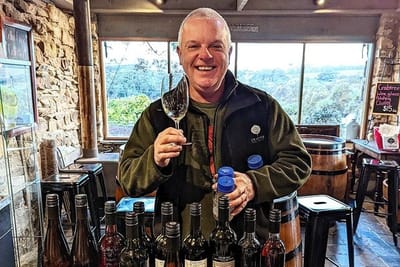ABOUT
Peter Burford, originally from Adelaide, South Australia, began his career at d'Arenberg Winery in McLaren Vale in 1989, then after studying winemaking at Roseworthy Agricultural College he returned as the Assistant Winemaker.
In 1995 he traveled to California where he made his first gold medal wine, an Alexander Valley Syrah. He continued to work as the Winemaker for Alexander Valley Vineyards, and then in 2000 he did two harvests in one year in North Eastern Thailand-making wine and brandy for Chateau de Loei Winery.
In 2001 he began working as the Winemaker and Operations Manager for Vinovation, Inc. This is where he began to explore the boundaries of the beverage industry by separating them on a molecular level. Vinovation was a melting pot of wine industry professionals where thinking outside the box was encouraged. Peter now applies his diverse knowledge of wine quality enhancement techniques to produce award winning wines, both non and full strength beverages, including ciders, beers and distilled spirits.
Whether he is 'sweet spotting" for balance or to produce non alcoholic beverages, he finds it the most challenging aspect within his field. Distillation goes hand in hand when producing non-alcoholic beverages and his experience with pot, continuous column, Soju, and vacuum distillation is extensive.
"Reformulating non-alcoholic beverages is extremely difficult and challenging. Alcohol provides sweetness and enhances the aromatics, tannin profiles, body and provides stability."
Peter now offers his unique talents to customers who are trying to perfect their products. His wealth of experience will eliminate the pressures involved with development through to final product. Peter is still the Chief Winemaker in the off season at Crabtree Wines in the Clare Valley, South Australia, where he focuses on Riesling.
His philosophies are derived from the following-
In 1995 he traveled to California where he made his first gold medal wine, an Alexander Valley Syrah. He continued to work as the Winemaker for Alexander Valley Vineyards, and then in 2000 he did two harvests in one year in North Eastern Thailand-making wine and brandy for Chateau de Loei Winery.
In 2001 he began working as the Winemaker and Operations Manager for Vinovation, Inc. This is where he began to explore the boundaries of the beverage industry by separating them on a molecular level. Vinovation was a melting pot of wine industry professionals where thinking outside the box was encouraged. Peter now applies his diverse knowledge of wine quality enhancement techniques to produce award winning wines, both non and full strength beverages, including ciders, beers and distilled spirits.
Whether he is 'sweet spotting" for balance or to produce non alcoholic beverages, he finds it the most challenging aspect within his field. Distillation goes hand in hand when producing non-alcoholic beverages and his experience with pot, continuous column, Soju, and vacuum distillation is extensive.
"Reformulating non-alcoholic beverages is extremely difficult and challenging. Alcohol provides sweetness and enhances the aromatics, tannin profiles, body and provides stability."
Peter now offers his unique talents to customers who are trying to perfect their products. His wealth of experience will eliminate the pressures involved with development through to final product. Peter is still the Chief Winemaker in the off season at Crabtree Wines in the Clare Valley, South Australia, where he focuses on Riesling.
His philosophies are derived from the following-
- When tasting wine, the eye preconditions our senses of taste and smell. Therefore a sound color is essential.
- The bouquet of the wine plays an integral part of the tasting experience. All of our wines possess intense aromas-primarily fruity with an integrated bouquet of complex attributes that provide fullness.
- The wine must have a good length of concentrated fruit. This provides a rich mouth-filling quality and texture that must be married harmoniously with its other qualities. These fruit flavors should also provide vitality, in that; the wine must be distinctly varietal.
- Young wines should be fresh, richly flavorful while older wines should have intriguing nuances from the flavor compounds that form gradually during oak and bottle aging. This is why longevity plays an important role as added years in the bottle may further soften and marry its complex components.
- Finally, balance is the most important component, since to some extent it is a description of all other quality objectives.
